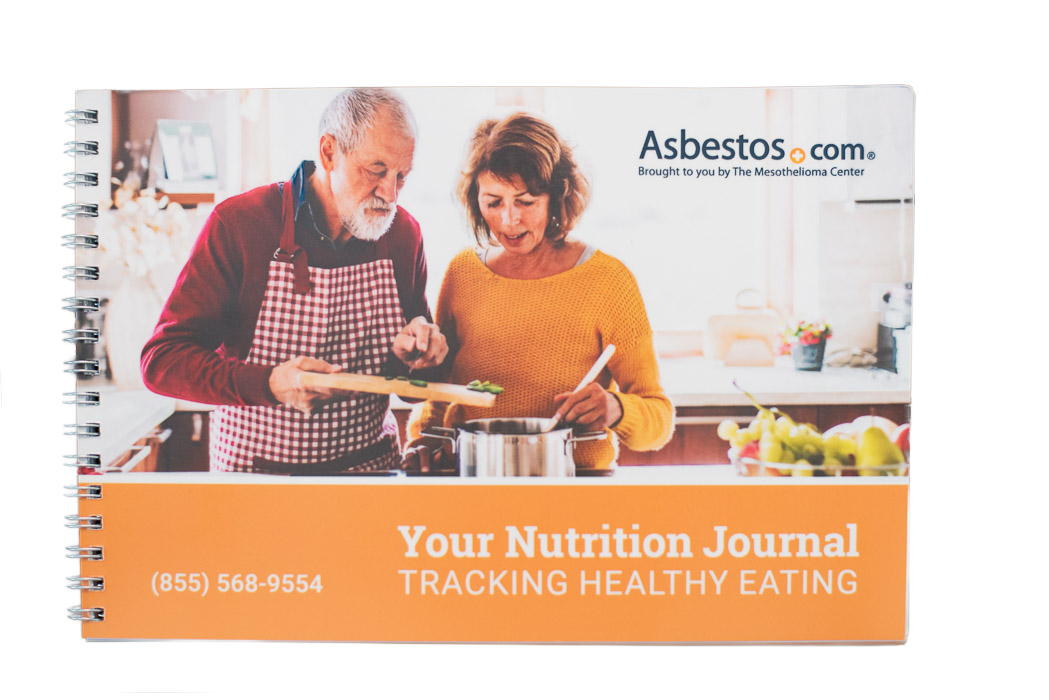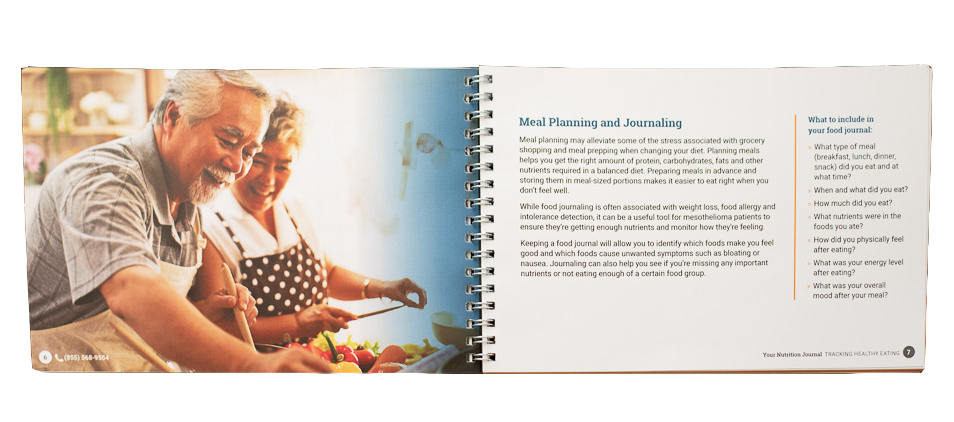How Can Keeping a Food Journal Help Mesothelioma Patients?
Health & WellnessWritten by Amy Edel | Edited By Walter Pacheco

Registered and licensed dietitian Tejal Parekh is passionate about helping cancer patients make nutritional choices that help improve their well-being. Mesothelioma treatment can reduce appetite, make swallowing difficult, cause fatigue and change the way foods taste. Parekh guides patients in finding the right balance of foods that can manage side effects, provide key nutrients and be enjoyed.
An important tool in determining which foods help patients feel their best is keeping a log of what foods eaten, when and how each made the person feel. Parekh worked with The Mesothelioma Center to tailor a nutrition journal with the specific needs of mesothelioma patients in mind.
Q&A with Tejal Parekh
- What are the benefits for mesothelioma patients and caregivers of documenting how certain foods may make you feel?
-
Treatment for mesothelioma can be challenging. Whether it’s chemotherapy, radiation or surgery or a combination, it is both physically and mentally stressful. The journal is an extremely useful tool because it allows you to see which foods work well for you during treatment and which foods are best avoided.
During the treatment phase, it’s easy to forget a lot of things – by keeping track, you’ll be able to look back and have a list of ‘best’ foods that you would want to eat/drink for the next cycle. It’s a free resource that comes with helpful tips.

- Are there certain foods that typically help patients feel good? Or foods that are more likely to cause mesothelioma patients to experience discomfort?
-
In general, we find foods that are soft or liquid are best when you are feeling nauseous or you don’t have much of an appetite. Smoothies, soups, yogurts and pastas are all good foods to try when you don’t feel like eating.
If smells from cooking bother you, try to eat colder foods such as sandwiches or cheese with crackers as these do not tend to be so bothersome.
Don’t forget to keep drinking! Water is great, but milk, 100% fruit/vegetable juices and soups will not only hydrate, but provide some extra nutrition too.
Specific foods to eat or avoid will really depend on your individual side effects. For example, if you are experiencing a sore throat:
- Try soft bland foods, as these are easier to swallow. Examples include yogurt, ice cream, cream soups, milkshakes, cottage cheese, puddings and mashed potato with gravy.
- Use sauces, gravies and other liquids to moisten foods. You could dip a grilled cheese sandwich into soup or dip toast into milk or coffee.
- Avoid dry rough foods such as crackers, granola, popcorn and crisp breads.
- Avoid spicy and acidic foods such as orange juice or hot sauces as these can irritate your throat further.
In addition to our nutrition journal, our nutrition guide breaks down recipes according to the side effects so it’s a wonderful book to keep on hand for some inspiration when you are having trouble finding the ‘right’ food to eat.

- Can tracking nutrient intake help people improve their diets?
-
Losing the desire to eat is extremely common and a number of changes can cause this to happen, including the stress of a diagnosis, the treatment and its side effects or pain that the tumor causes. If we go too long without eating enough, we lose weight – typically a combination of muscle and fat.
Excess weight loss can lead to:
- Delayed healing after surgery
- Longer recovery time in between chemo cycles
- Possible delayed radiation therapy because of debilitating side effects
Dehydration and fatigue are also common side effects from eating poorly. All these factors can severely impact one’s quality of life.
To avoid weight loss, we want to make sure we are getting not only enough calories but also enough protein. Proteins are the building blocks of our cells. They are responsible for the body’s growth and repair. Getting a mix of calories from protein, fat and carbohydrates will help to keep you strong both mentally and physically.
Often, a day can fly by and we don’t realize how little we have eaten. Keeping track allows you to pinpoint which nutrients are lacking so you can be more vigilant about eating/drinking more.
Tracking nutrients (or calories) may be more challenging than simply writing down the foods you’ve eaten. If this is the case for you, don’t worry too much about that. Just note down the foods you eat or drink and how much (roughly).
If your doctor’s office has a dietitian on staff, they’ll gladly take a look at your journal and let you know how you’re doing. They’ll also be able to provide you with more detailed instructions on how to get stronger and avoid further weight loss.

Access easy recipes that can help you manage your cancer symptoms.
Get Your Free Guide- Did questions participants ask during The Mesothelioma Center’s nutrition webinars you’ve participated in help you when working on the nutrition journal?
-
Most definitely! We really listen to our nutrition webinar participants to understand the challenges they experience during this journey. From my years of experience working at a cancer center to our interactions with our listeners, we created a wonderful resource for patients.
These conversations also help me choose the recipes and tips that I share in the health and wellness blogs I write for Asbestos.com. Some of these include hydrating coolers, satisfying smoothies, hearty soups and comforting soft foods. There’s something for everyone in the blogs and I hope you find some new go-to meals that will make a tough situation just that little bit better.
Often, it’s the little things that make a big difference. Finding a new drink or a new food that sits well can be a great feat and it can be really helpful to document that in your nutrition journal.
- What are some of the most common questions mesothelioma patients and caregivers ask you about nutrition?
-
We do get some commonly asked questions and fortunately our blogs answer many! These are a few of the most commonly asked questions:
Does sugar feed cancer?
What kind of foods should I be eating to help keep me a healthy as possible?
Another commonly asked question is “Do you recommend meeting with a dietitian?” Of course my answer is a resounding yes!
Dietitians are key players in your army of fighters. As I mentioned earlier, weight loss leads to delayed treatment and worsening of symptoms. They can arm you with the tools you need to stay stronger and healthier during your treatment.
Your medical team will be able to put you in touch with a dietitian if you don’t already have one. For more information you can check out our other blogs at the Mesothelioma Center including our most recent nutrition webinar!






